Reflections on the Panama Canal
The Canal made a number of impressions.
I made a trip to Panama City, Panama last week for a conference. It was my first trip to the country and I did not really know what to expect of the city and its environs. I was struck by was the remarkable number of high rises (many of them quite new) and the amazing amount of construction. On the construction, I was further struck by the number of public works oriented projects (road, a metro, refurbishing of the colonial section, housing for the poor, new government buildings, etc.) that I have to wonder if Panama might not find itself in debt problems in the coming years.*
Punta Paitilla in the background, with a construction project in the foreground.
However, what was really instructive to me was my visit to what was the Canal Zone and to the Canal itself. As my colleague, Greg Weeks noted (both when we were at the Canal, but also at his blog), we have read about and taught the significance of the Canal and the Canal Zone for a long time, but there is something especially instructive about seeing the scale of it all.
Now, yes, the scale of the Canal is impressive, especially when one considers that it was constructed in the late 19th/early 20th centuries. Indeed, the doors at the Miraflores Locks are the originals and have been in operation for 98 years. The engineering of it all is remarkable as is the impact the Canal has had on world trade.
However, on the political/historical side of things, I was especially struck by the scale of the former Canal Zone, which used to be US territory until the turnover to the Panamanian government on December 31, 1999 as a result of the Torrijos-Carter Treaty signed in 1977. It is one thing to read that the Canal Zone was a buffer zone created to allow the US to govern and maintain the Canal, it is another to see that at one point the are of the Zone near Panama City was a city unto itself on primo real estate that was granted to the United States via a treaty negotiated between the US and a French national only two weeks after Panama had gained independence from Colombia. The Hay-Bunau-Varilla Treaty, which gave the US control of the Zone in perpetuity, was created via talks between Secretary of State John Hay and Phillipe Bunau-Varilla, a Frenchman who had been directly involved in the French attempt at building a canal, and who had significant business interests in the process. He was not negotiating in the interest of the Panamanians. Really, the entire affair was imperialism, pure and simple, and any understanding of the events in Panama since its independence have to be understood in this context.
As such, when we try to understand events like the 1964 riots over the flying of a Panamanian flag, and the Johnson administration’s response thereto, the history (and the geography) have to be taken into consideration. (Of course, Johnson saw it all as left-wing agitation, not to mention with a great deal of arrogance, saying about the situation: “I’m not going to be pushed around by a *** country no bigger than St. Louis”).**
Or, for that matter, when we try to understand why Carter negotiated the handover in the first place, and the context of the Ford-Reagan battle in 1976 on this issue.***
None of this is a new revelation in regards to nationalism in Panama (or elsewhere in Latin America, and around the world), but it was just something that was really brought home by seeing the actual context.
More generically, the entire tale is one that should remind us that it can be all too easy to ignore the way US actions affect local populations (and why local populations often harbor substantial, and well-founded, resentments against the United States—something that struck me this morning as I listened to a story about the US drone war in Waziristan). One of the things that Americans (both politicians and everyday citizens) need to be better at is looking at our actions from the perspectives of those our actions directly effect. It is all to easy to engage in the type of rhetoric that Reagan did in 1976 (“We dug it, we own it”) and get swept away in our own power-created self-righteousness.
One passing thought that strikes me as further fodder for thought in the current political climate: the original attempt to build the Canal was a private venture, that eventually collapsed (as was the second attempt). The third, successful, attempt was a government project.
All photos by me. More here.
Posted at both OTB and PoliBlog.
*It is true that the country makes a remarkable amount of money from the Canal and the country has become a major banking center (to go along with a significant intake from tourism) but I still could not help but wonder if there was too much happening too quickly. Still, that is an impression based in studying the region, but not an observation based on actual empirical evidence.
**As quoted on p. 163 Henry Raymont. 2005. Troubled Neighbors: The Story of US-Latin American Relations from FDR to the Present. Cambridge, MA: Westview Press.
***In looking for a quote, I came across this piece from The American Conservative that discusses a Firing Line debate between Reagan and Buckley on this topic, which includes the following:
The Reagan-Buckley friendship en-dured two sharp fractures over foreign policy. The first has become legendary. In 1978, Buckley and Reagan, two paladins of the American Right, arrayed themselves on opposing sides of the Panama Canal treaties being negotiated by the Carter Administration. Buckley, who favored turning the canal over to the Panamanians, invited Reagan, opposed, to debate him on “Firing Line.” The knights had esquires: James Burnham, George Will, and Admiral Elmo Zumwalt stood with Buckley. Pat Buchanan, Roger Fontaine, and Admiral John McCain Jr., father of the senator, were with Reagan.
Back then, conservatives could disagree with one another about foreign policy openly and civilly. Reagan sounded notes familiar from recent debates over America’s role in the Mideast: “I think we would cloak weakness in the suit of virtue” if America were to surrender the canal, he warned. “With this treaty, what do we do to ourselves in the eyes of the world, and to our allies? Will they, as Mr. Buckley says, see that as the magnanimous gesture of a great and powerful nation? … I think the world would see it as, once again, Uncle Sam putting his tail between his legs and creeping away rather than face trouble.”
Buckley’s response would today get him branded an unpatriotic conservative. “We donegotiate under threats,” he told Reagan. “Ninety-nine percent of all the negotiations that have gone on from the beginning of this world have gone on as a result of threats. … The fact of the matter is that there are people in Panama who don’t accept the notion of Governor Reagan about the undisputed, unambiguous sovereignty that the United States exercises over that territory.” Likening Panamanian demands for sovereignty over the Canal Zone to the American Revolution, Buckley observed, “All of a sudden we find that we resent it when people say that they’re willing to fight for their freedom.”
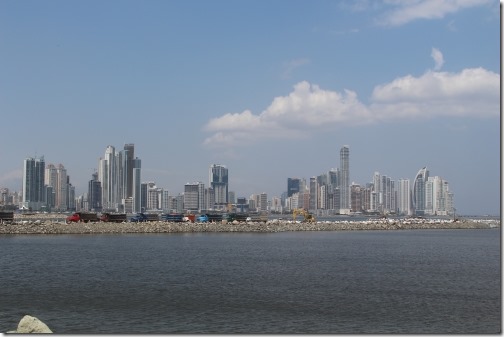
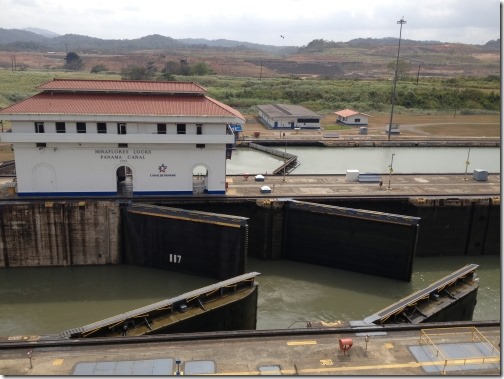
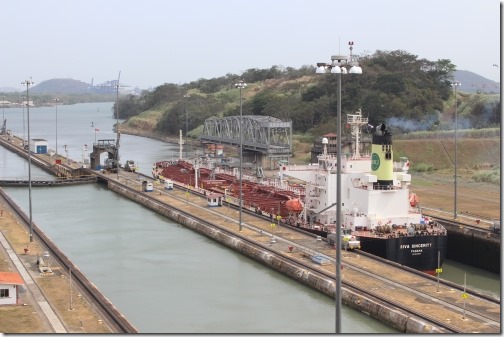

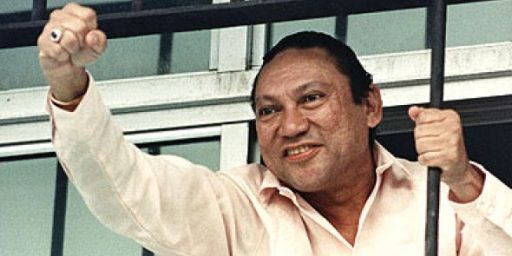
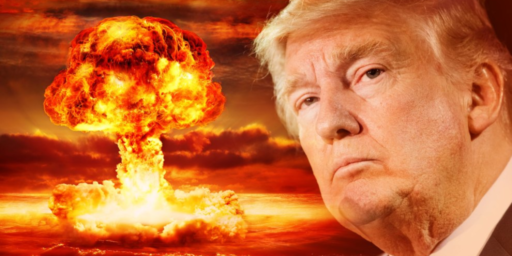


I was glad to see your picture with Panama hats.
@rodney dill:
🙂
I spent some time in Panama in the summer of 1989. From your photos it seems the place hasn’t changed a bit!
That was 10 years before the turnover of the canal, though everyone knew the turnover was a done deal. It was also when Noriega was still in power, though his days were fewer numbered more than anyone knew at the time.
Did you learn about the canal expansion that is due to be completed in 2015? The Panamanian government expects to double the canal’s capacity and accordingly earn enough wealth to shed the country’s third-world status and join the first world. They have estimated that the number of Panamanians living in poverty will fall by about a third, although it will still approach 20 percent.
The size of the ships able to use the canal will dramatically increase, too, up to 49 meters abeam, which will have all kinds of cascading economic effects on merchant marine fleets and worldwide major ports.
Coincidentally, early this month I happened across an old photo of USS Missouri squeezing through the lock of the canal in 1945. It had only six inches to spare on each side!
@Donald Sensing: Yes, the expansion will be impressive in terms of what it will do to the ships that can pass through. And there is a great deal of anticipated income associated with that expansion. The sheer number of construction projects underway (and I did not photographically chronicle them) are rather amazing, so hopefully the revenue will match the ambitions.
Steven, I suspect you don’t do impressions but did you take away an impression of Panama’s attitudes towards America and Americans today?
(Cool find on the Reagan/Buckley debate)
Dogdamned anti-colonialist. I never did like his looks with his self-serving air of superiority.
@rudderpedals: In all honesty, I wasn’t there long enough to get any good feel on that count.
On thing is for certain: it is tourist friendly.
I will say that the Canal museum in the old town square made it quite clear that the Treaty of 1903 was a bum deal for Panama.
I was in Panama in 2004, and looked at the property there.
High-rise condos were typcially bought by South Americans using cash, not Panamians using mortgages. Many of those condos were maintained by essentially uninhabited. When I was there.
Then, at least, the building boom was fueled not by Panamanian borrowing but by wealthy South Americans offshoring their wealth. If you are a wealthy South American, legitimate or other wise, you are wise to keep a portion of that wealth somewhere besides your home country. With an American banking system and security guaranty make Panama one of the best places to offshore financial assets. The Panamanian government encourages foreign investment with a variety of visa programs
http://www.isla-offshore.com/second-passport/panama-passport-residency-citizenship/
Given Panama’s historic ties to Columbia and Venezuela, I would guess that Hugo Chavez has been very, very good for Panamanian property developers
We couldn’t do that today…it’s more important to keep tax rates at historic lows than to invest in infrastructure.
@Donald Sensing:
I have to agree. The picture doesn’t look that much different than when I was there in 1998. High rises and construction. Of course, once you reach a certain level of high rise, new construction starts to blend.
@ Steven Taylor,
Panamanian debt has actually fallen slightly in the last year as a percentage of GDP, but it does borrow in USD which puts it at significant risk of financial crisis should its revenues from the Canal dry up.
@Donald Sensing: @JKB: There is definitely more there now than was the case even in 1998. There is a whole new set of high rises not in the above picture called ‘Costa del Este” that is only a few years old (I am not sure of the exact age).
At a minimum the Trump Tower in the above photo (the curved tower on the right almost at the point) is new in the last several years.
@Tylerh: Banking is a huge deal, it would seem (and I have little doubt that some of this money is of questionable sources, shall we say). And yes: a lot of those buildings are either occupied by foreigners or perhaps not fully occupied.
Good piece. Thanks for sharing your photos.
This bit reminded me of the capstone paper I wrote for my history degree.
In the 1690s, the Scots tried to make use of the isthmus to profit from world trade. The “Darien Scheme” was a joint-stock private venture that ultimately failed primarily due to mismanagement and poor leadership (although the English and Spanish had their hand in assisting the failure).
It is a fascinating episode in Europe’s attempts to colonize the region. Whenever the topic of the Panama Canal comes up, I feel compelled to discuss the Darien Scheme. Not many people realize that Scotland had once tried its own “Panama Canal” so-to-speak.
Cheers.
(Wikipedia is largely accurate for those who are interested. Also, Simon Schama devoted some time to it in his epic documentary A History of Britain.)
@PogueMahone: The entire history of the attempt to build canals/overland transport in that region is quite interesting,
Now, see, that sounds like an old-school, look-reality-in-the-eye conservative, the kind with no patience for Wilsonian pie in the sky.
I actually could hear the tiny violins and harps playing in the background while reading this loopy blog post. Geez.
In any event, of all the dumb things Carter did — and there were many — giving up control of such a strategically vital place on the map arguably was the dumbest. So far it hasn’t bit us in the arse. And maybe it never will. But as we look ahead towards the inevitable trade and naval and other conflicts, in the many decades to come, one never precisely can tell in advance the time or scope of the untoward ripple effects of being liberal, i.e., of being weak minded. Hopefully we never lose a bunch of sailors, or have a capital ship sunk in toto, or have many tens of billions of dollars or more shaved off our GDP, or have many hundreds of billions of dollars or more shaved off global GDP, because the Peanut Farmer decided to make nice-nice with the Panamanians. Emphasis on hopefully.
@Tsar Nicholas: I do appreciate you showing up and making my point. I figured someone would.
16 posts. Who won the pool?
@Tsar Nicholas:
Darn right, Tsarevich! We done stole that territory fair-n-square!
The Tsar thinks he’s Nicholas I, but really he’s Nicholas II.
Darn right, Tsarevich! We done stole that territory fair-n-square!
Maybe he’s thinking of Constantinople?
@ Anderson…
I think Tsar is actually Catherine the Great…and the prediliction with horses is no myth.
I did and still think that it was a mistake to turn the total control over to Panama. Some sort of consortium, partnership, or other arrangement could have been made.
@Tyrell: Here’s the deep dark secret, Tyrell: we can take it back during a war, if we want to.
And if we didn’t have the capacity to take it back, “having” it would be meaningless anyway.
@Steven L. Taylor: Who knew the fate of the United States was inextricably linked to the Panama Canal? In fact Tsar has, over the years, made it known the fate of our country is continually on the brink, with just one mistake sufficient to destroy us for all time.
The U.S. is such a magnificently fragile place.
@Ben Wolf: Indeed.
The canal zone was also a great place to stick people during WWII the U.S. didn’t trust 100%. A family friend who had immigrated from Germany in the 1920’s was sent there, since they didn’t trust him to go to Europe. He said he spent the entire war walking around and dumping kerosene on puddles and lighting them on fire to control the mosquito population. Malaria has an interesting role in the history of the canal.
@Ben Wolf:
And only politicians with “R”s at the end of their names can save America from going over the Precipice of Disaster! (TM).
Had people like Reagan and the Tsar been allowed to prevail, we would be fighting an interminable guerrilla war in Panama, not Afghanistan. And would probably be wondering, ” Why do they hate us?’
@stonetools:
I don’t recall Reagan challenging the Panama Canal treaty once he became POTUS. At least not seriously enough to warrant massive media coverage at the time.
The Tsarevich is a different story. A bedtime story meant to scare children into taking logic classes.
Dayamn! Even John Freakin’ Wayne disagreed with Ronnie Rayguns over the Panama Canal Treaty:
http://www.nytimes.com/1987/03/16/us/reagan-angered-john-wayne.html
I remember that debate. Buckley wiped the floor with Reagan.
As a lefty at the time, I found it to be very entertaining.
@C. Clavin: “I think Tsar is actually Catherine the Great”
In her post-enlightenment phase
The more interesting question should be whether the Canal and the Banks are staffed and run by Panamanians or are the run by ex-pats who will eventually leave Panama with most of the wealth.
Expatriate workers receiving salary says rather little about where wealth generated by an activity will end up. Shareholding and assets, well that is another matter
But insofar as the Autoridad only presents its human resources information in Spanish, visions of the darkies not being able to step up to run the canal, and it being massively staffed by norte-americanos would seem fairly fantastical.
Panamanian banks that focus on the off-shore sector seem to be rather like off-shore/internationally focused banks everywhere, with a melting pot of staff.
Thank you Mr. Taylor for such precise and accurate narrative of the Panama Canal and the US relations with Panama since the negotiations of the former 1903 Treaty, a treaty that, as you pointed out, no Panamanian signed.
There is a second treaty signed between Carter and Torrijos in 1977, the Neutrality Treaty; the US will have priority over the Canal if the US consider the Canal in danger, mishandled, or threatened. However, the Canal is 100% run and managed by the Panamanians, who have wisely found the way to run it as an enterprise, making it very profitable for Panama.
I have never read a story so objective and unbiased as this one; it has impressed me a lot as I believe it did to all the readers based on their comments.
I hope you will also have the opportunity to travel to Panama again and meet the people; I would like to read what you experienced.
@Silvia Maravilla: Thanks for the kind words. I do hope to have the chance to return in the future!
Steven, on infrastructure and construction: “Still, that is an impression based in studying the region, but not an observation based on actual empirical evidence.”
I imagine by now that the overwhelming majority of Americans can’t really make an informed observation on infrastructure and construction for two reasons. First, we don’t know what it’s like to build up from a third-world level, and second, we’re more used to declining from a first-world level that we don’t even know what maintaining a first-world level looks like.
The effort that the Panamanians have put (even if with borrowed money) into upgrading the canal shows what value they place on it. Wish we’d get that serious about upgrading our national infrastructure.
To Tsar, I remember being just as ignorant and as stupid and ill informed about Panama as you.
The difference being it was 1978 and I was an 18 year old college freshman at UCLA and went into Prof. Leonard Freedman’s office who was the chair of the Poli Sci Dept.
I said pretty much what you did – that it was a mistake and that Reagan was right.
He looked me square in the eye and said, “after this vote is taken and should the Canal be handed over, you will not read one article about this issue as its been completely demagoged by the conservatives, turning a non issue into a political club against those who oppose it. The Canal is not a vital security interest, transits less than 2% of our cargo from coast to coast and isn’t big enough for our carriers or battleships to pass through. Its a dead issue never to be heard from again.”
So, Tsar, he was incredibly prescient and you are incredibly ignorant. No one cared after the vote except for the 5 Dem senators who lost re-election because morons like you made this into a bullshite issue.
Although I have never been to the Canal, as Mr. Taylor has, I have read two books on it: Panama and the Canal, published just as the Canal was being opened, and The Truth about the Panama Canal, printed shortly after the treaty alienating the Canal from the United States and authored by an insider to the process.
It may interest people, then, to know that the Panamanians staged their very brief but successful war for independence from Columbia so that they could get the ten million dollars the United States had promised them for the canal zone. The people of Panama were eager for two reasons: the ten million pre-inflated dollars, among a sparse population, and the jobs from the Canal project, which had all evaporated with the collapse of the French endeavor.
Also, all who know anything of the Canal should realize that the actual digging was only half the accomplishment. The eradication of Yellow Fever had to be done first. The United States eradicated Yellow Fever from Havana (then a territory of the United States as consequence of the Spanish-American War), and from that experience to Panama. The United States was instrumental in eradicating Yellow Fever from the entire world after these successes, a project that lasted for many decades.
The book The Truth about the Panama Canal takes quite a long time to explain things, but it does, at the end, get to the bottom of the matter. The people of Panama were deeply aware that the United States pays Germany, Spain, and several other countries many millions of dollars annually for the privilege of having military bases in their territory, but paid Panama a mere annual pittance for having the Canal. The original ten million dollars, of course, was long forgotten.
The United States gained international acceptance for the Canal by not profiting from it, at least not directly. All ships going through the Canal were charged only what was needed to maintain the Canal. No profits went to the United States. By the same token, no profits went to Panama either (except the annual pittance). This was the source of resentment in Panama, which, in my opinion, could have been ameliorated and accommodated by allowing at least some profit to ensue from the Canal, to go to Panama in general.
The same book concludes that the Canal Treaty under Carter was indeed a “giveaway,” just as the critics asserted. The United States did, in fact, own the Canal, pure and simple. The United Stated had purchased the Canal Zone for ten million dollars, and owned the Canal inside the Zone by right of fabrication.
* * * * *
Mr. Taylor brings up the interesting point that the United States government project succeeded, where the French private enterprise failed. It might also be noted how much the Canal was a military project, run by military men in the second half of its construction. When the head engineer, Mr. Stevens, left the project when he had seen it to the point that there was no doubt that the Canal could be built and would be built, Theodore Roosevelt was furious, and had the project headed only by military men thereafter.
@Justinian:
I must confess, in my experience almost any book that has “The Truth About…” in the title almost certainly is a polemic, if not propaganda. Based on who I can find, the book in question fits the bill.
I would recommend The Path Between the Seas by David McCullough.
@Justinian: And BTW, a miltary project is, by definition, a government project.
@Steven Taylor:
I agree that the title “The Truth About” makes one suspicious; all I can say is that the book is much better than its title! I’ll see if I can find time to acquire and read the book you recommend. As you might guess, I am a pretty bookish person. —And yes, a military project is a government project: the one concept is a subset of the other.